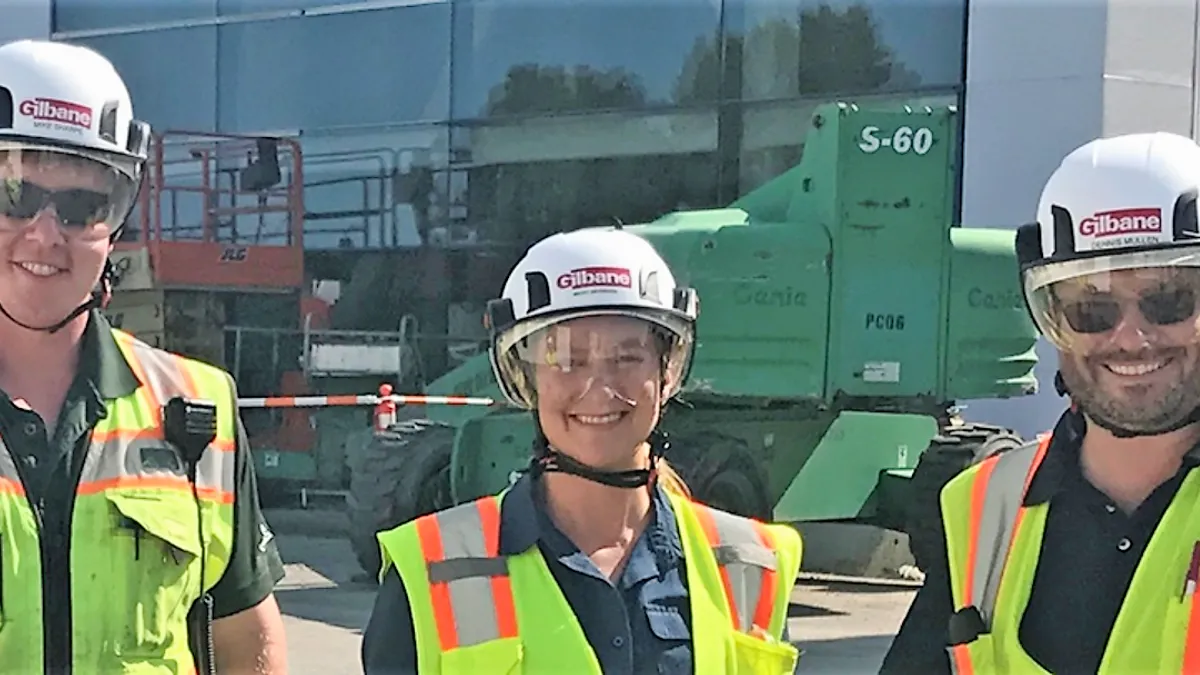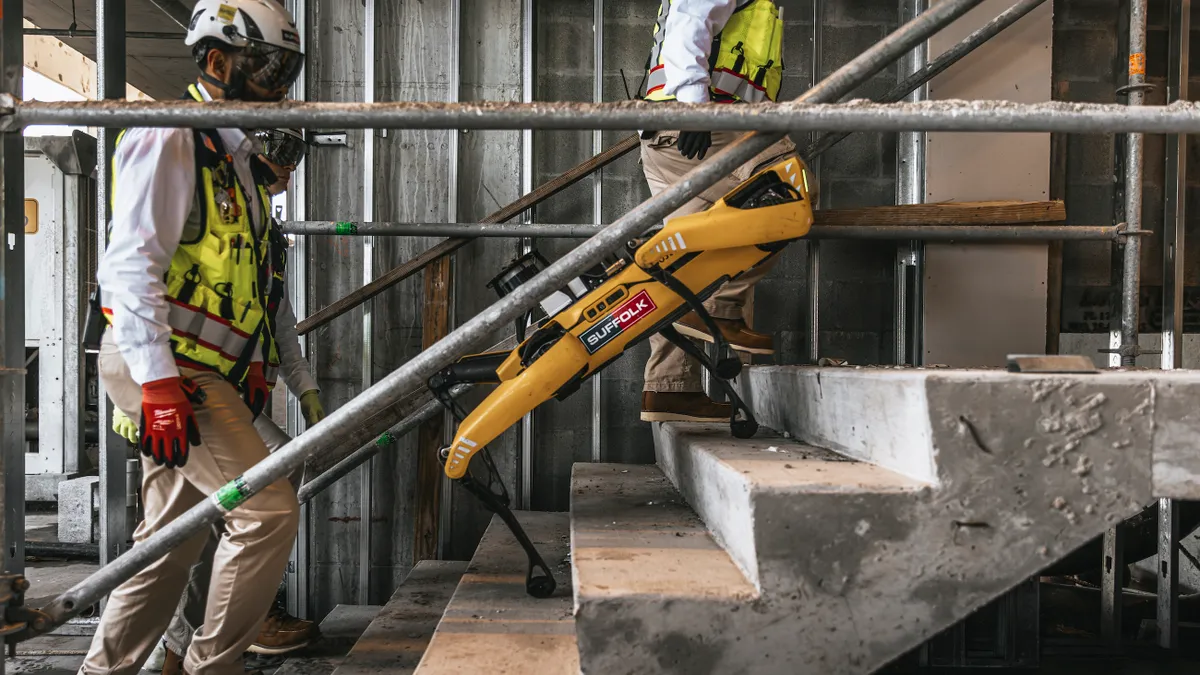See all the women featured in our 2019 Women in Construction series here.
Rebecca Severson’s leadership and professional expertise represent the meeting of two seemingly distinct worlds — construction and the military. Over the past 21 years, her ability to grow in both tracks, juggling the demands of the field while meeting service requirements of the Air National Guard, has had many who cross her path asking, “how does she do it all?”
Severson entered the construction industry in 1998 with a bachelor’s degree in architectural engineering from the Milwaukee School of Engineering. She came on board with Gilbane as a project engineer, advancing through project manager and regional safety manager roles to her current position, vice president and corporate director of safety.

Severson entered the Guard, a division of the Air Force, the same year and has spent 18 of her 21 years of service as a bioenvironmental engineer, focusing her efforts on what she describes as “the health side of safety.” On a monthly basis, Severson helps ensure occupational safety and industrial hygiene of various workplaces via air sampling, noise mitigation, radiation monitoring and other activities. She identifies the health effects of what is measured and develops communication strategies that will allow workers to fully understand the risks that are present.
Frequently tapping into this knowledge pool for her work as Gilbane’s safety director, Severson also credits military leadership training for helping her “every step along the way.”
Building a culture of caring
Severson’s role is centered around the “Gilbane Cares” philosophy, which insists on every worker returning home safely at the end of the day.
The program, which celebrated its 10th anniversary in December, was born out of a culture that was already very much safety-oriented, Severson explained. It builds on a positive track record by targeting the ambitious goals of fully incident- and injury-free projects because, as Drew Gaskins, a Gilbane business unit safety director puts it, “one incident is too many.”
At a high level, Gilbane Cares is centered on relationships, according to Severson, and “truly caring for people” by prioritizing them, not the statistics. It translates into efforts by Gilbane personnel and partners to respect one another, to understand why a task is being carried out a certain way and to rally to find ways it could be done more safely.
The goal is not to force adherence to policy and procedures, Severson said, but to motivate each employee to want to seek out safer possibilities.
‘Everybody in the pool is a lifeguard’
Safety is not a conversation reserved for the jobsite, Severson said, but requires a partnership from workers across departments, from the office to the field.
“The best way to put it,” according to Don Naber, senior vice president and director of risk management, “is that everybody in the pool is a lifeguard.” And Severson’s role, he said, is to make sure every worker is equipped to take on that job.
Gilbane incorporates activities like stretch sessions into the work day, and offers incident- and injury-free orientations for tradespeople as well as First Aid/CPR training for all employees. The contractor also rolled out Kask helmets on its jobsites in 2017 as a lighter, better-rated alternative to traditional hardhats.
Severson is out in the field as much as possible, said Gaskins, looking for ways that workers can build on this foundation to bring safety into more of their processes.
"[She's] always challenging us to think about it in ways that may not be readily apparent right in front of us. What can we do differently? What more can we do? Who else can we invite into the dialogue?"

Linda Graves
Vice president of diversity and community affairs, Gilbane
An astute listener, she recognizes that every situation presents its own set of variables, said Naber. Rather than imposing blanket solutions, Severson is in the habit of “taking everything in and then coming back after gathering a really good understanding of what is happening” before setting out a path forward, he said.
“I’ve never known Becky to turn away from a challenge,” added Linda Graves, Gilbane’s vice president of diversity and community affairs. Whatever the roadblock, Severson encourages her teammates to “think about it in ways that may not be readily apparent,” Graves said. “What can we do differently? What more can we do? Who else can we invite into the dialogue?”
Evolving with the marketplace
Severson also encourages her team to make sure Gilbane Cares is keeping pace with changes in the marketplace, and that the brand adapts accordingly with regard to tools, staffing and culture, according to Naber.
Quick to pivot toward technology in this effort, Severson helped make the case to leadership for deploying Triax Technologies’ Spot-R clips as a real-time window into safety risks on jobsites. The wearable devices can detect when a worker has been hurt and notify surrounding teammates, as well as track worker locations to ensure everyone is accounted for.
Severson viewed the product as a way to establish Gilbane as a leader in both technology and safety, she said, and recognized an opportunity for the firm to use data proactively instead of reactively. Her team is now able to measure “near misses,” or precursors to injury, and identify ways to mitigate not just an incident but also the risks that could potentially lead to it.
As an early adopter, Gilbane was able to work closely with Triax to better hone the product to its needs. Some of the enhancements that came about from this collaboration were a longer clip battery life, a handheld scanner to speed up clip registration and a feature that flags whether equipment is being operated by someone without the requisite training and qualifications. The improvements, according to Naber, allow Gilbane (and other contractors looking to make similar safety strides) to get their people “registered, through orientation and on to the jobsite in a much more expedient manner.”
Moving the industry forward
Severson is a champion of relationship building, which is key to the Spot-R and other Gilbane Cares initiatives. Mentorship was particularly valuable in her career growth, she said, and for this reason, she is more than willing to offer some lessons learned with mentees.
One forum in which she shares this experience is Gilbane’s employee resource group for women, a recently launched program that fosters growth, development and leadership opportunities for women both at Gilbane and in the broader industry.
“I’ve observed her as a mentor to others in how to balance … responsibilities both in your family environment as well as in your work environment,” said Graves. “We often will lean on each other for ideas on how to make it all happen.” Severson’s organizational skills, attention to detail and sense of humor shine through in these conversations, she added.
Even with a full plate of corporate and military responsibilities, Severson doesn’t skip opportunities to offer her ideas as a mentor or to help advance the industry. “Safety is not proprietary and we can all benefit from it,” she said. “I have experiences and examples and information to share, so why not share it?”



















